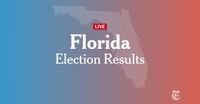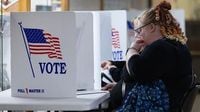In a decisive electoral showdown, voters in Wisconsin and Florida expressed their sentiments regarding President Donald Trump and the Republican Party during key races held on April 1, 2025. The results from these elections could potentially reshape the political landscape in both states, as the GOP looks to maintain its foothold in Congress.
In Florida's 1st Congressional District, Republican Jimmy Patronis emerged victorious in a special election to fill the seat vacated by former Rep. Matt Gaetz, who resigned amid sexual misconduct allegations. Patronis, who serves as the state’s chief financial officer, won the race despite facing a formidable challenge from Democrat Gay Valimont, who raised nearly $6.5 million compared to Patronis’ $2.1 million. This district, which has historically leaned Republican, saw Trump endorsing Patronis with a promise that he “WILL NEVER LET YOU DOWN!” on his social media platform.
Meanwhile, in Florida's 6th Congressional District, state Sen. Randy Fine also claimed victory over Democratic challenger Josh Weil. Fine's win is significant as he was tasked with keeping the seat red after former Rep. Michael Waltz was appointed by Trump as national security adviser. Despite being heavily outspent—Weil raised around $9 million compared to Fine’s nearly $1 million—Fine managed to secure the seat in a district that Trump won by over 30 points in the previous election.
Both special elections in Florida were crucial for the GOP, as they aimed to solidify their narrow majority in the U.S. House of Representatives, where Republicans currently hold 218 seats against 213 for the Democrats. The outcome in Florida, while not shifting control of the House, provides Republicans with some breathing room in a closely divided chamber.
In Wisconsin, the spotlight was on the state Supreme Court race, which has become a proxy battle reflecting national political tensions. The election drew a staggering $90 million in spending, marking it as one of the most expensive judicial races in U.S. history. Brad Schimel, a former state attorney general backed by Trump and billionaire Elon Musk, faced off against Susan Crawford, a Dane County judge supported by prominent Democrats including former President Barack Obama and billionaire George Soros.
The stakes were high, as the Wisconsin Supreme Court plays a crucial role in determining election-related laws and resolving disputes over future election outcomes. Trump emphasized the importance of this race, stating, "Wisconsin’s a big state politically, and the Supreme Court has a lot to do with elections in Wisconsin. Winning Wisconsin’s a big deal, so therefore the Supreme Court choice … it’s a big race."
Elon Musk notably visited Wisconsin just days before the election, personally handing out $1 million checks to two voters in an effort to galvanize support for Schimel. The outcome of this election could significantly influence the direction of the court and, by extension, the political landscape in Wisconsin and beyond.
As voters headed to the polls, the atmosphere was charged with anticipation. Many voters expressed their desire for change, highlighting issues such as healthcare and social security as top priorities. In a district that has traditionally favored Republicans, the enthusiasm from Democratic voters has sparked concerns among GOP candidates about their hold on these crucial seats.
The results from these elections are more than just numbers; they reflect the broader sentiments of the electorate regarding Trump’s presidency and the GOP’s direction. As the dust settles from these pivotal races, both parties will be analyzing the results closely, preparing for the next electoral battles ahead.
The significance of these elections cannot be overstated. With Trump back in the spotlight and the GOP facing challenges from energized Democratic candidates, the political dynamics in both Florida and Wisconsin are shifting. The outcomes not only affect local governance but also serve as indicators of national trends as the country approaches future elections.
In summary, the special elections in Florida and the Supreme Court race in Wisconsin have revealed a landscape ripe with political fervor, reflecting the ongoing battle for control and influence within American politics. As voters continue to voice their opinions through the ballot box, the implications of these races will resonate far beyond the immediate outcomes.







